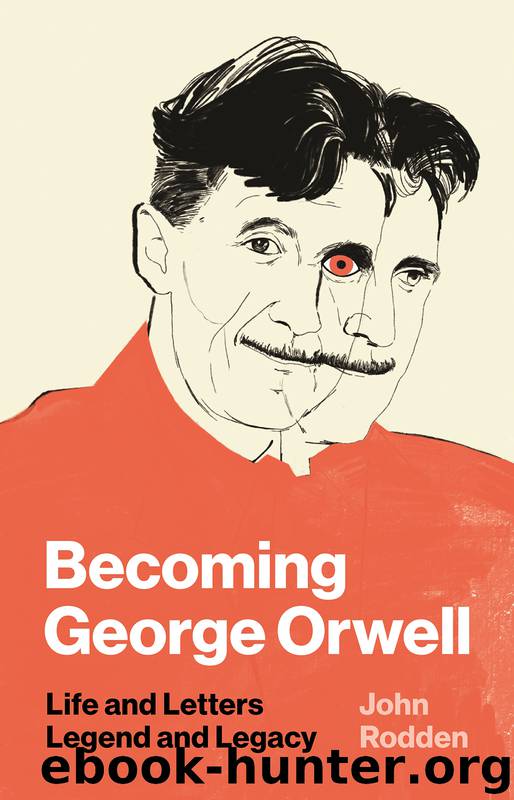Becoming George Orwell by John Rodden

Author:John Rodden
Language: eng
Format: epub
Publisher: Princeton University Press
Published: 2019-11-16T00:00:00+00:00
CHAPTER 9
How and Why Orwell Became “A FAMOUS AUTHOR”
Surfing the Tides of Time
The Contingencies of Fame
The last two chapters have meditated at length on the vicissitudes of reputation, the whirligig of fame, and the prerogatives of Clio—and specifically on the utter obscurity of Jean Malaquais in contrast to the spectacular renown of Albert Camus and especially George Orwell.
But how? Why? Comparative biography and history can furnish us with some specific, local clues for this pair of instances. Yet the hows and whys of the macrocosmic processes in a sociological sense remain to be answered. Given the scale and extent of Orwell’s phenomenal reputation—which extends (unlike that of Camus) far beyond intellectual circles and cultural opinion expressed in his native language—let us broach the larger hows and whys in his own case. After all, no modern writer has a higher overall literary reputation, that is, a greater aggregate balance of critical esteem and public recognition.
Orwell is not just the most famous British writer of the last half of the twentieth century, but also the highest best seller of serious fiction in any language. Not only is he the English intellectual most revered (and possibly reviled) by several generations of intellectuals since 1950, but his last two works, Animal Farm and Nineteen Eighty-Four, are scholastic fixtures, firmly institutionalized in Anglo-American school curricula and even taught outside the anglophone world, especially in Germany and Austria. (Berlin even boasts a George Orwell Oberschule in Lichtenberg.) Not a single book that he wrote is presently out of print in English; meticulously edited by Peter Davison, the multivolume Complete Works of George Orwell have been published in 22 volumes, presently available both in cloth-bound and in paperback editions.
Yes, it is hardly believable, scarcely even imaginable. Yet it also needs emphasis: this was not always so. Indeed it is likely that if Orwell had passed away little more than three years earlier, before his premature death in early 1950—that is, before the American edition of Animal Farm appeared in an aggressively promoted Reader’s Digest edition in August 1946—he would be utterly unknown today outside academic circles. Perhaps he would only be familiar to literary scholars who specialize in British studies of the 1930s. In fact, I would argue that if he had died even a year before his death at midcentury, in autumn 1948—that is, before completing his last book, Nineteen Eighty-Four—he would be regarded as a clever fabulist, a one-book author who had finally found his métier by abandoning the realistic novel and turning to satirical fantasy. Animal Farm would have been touted not just as a devastating allegory applicable to the history of Stalinist Russia, but also as a modern parable that offered salutary lessons for the probable course of revolutions in general. Yet it would not have contributed numerous coinages to the political lexicon, for the circulation of its catchphrases came no earlier than the mid-1950s, that is, only in the aftermath (and as a consequence) of that very practice occurring with Nineteen Eighty-Four as his dystopia permeated Western culture.
Download
This site does not store any files on its server. We only index and link to content provided by other sites. Please contact the content providers to delete copyright contents if any and email us, we'll remove relevant links or contents immediately.
| Ancient & Classical | Arthurian Romance |
| Beat Generation | Feminist |
| Gothic & Romantic | LGBT |
| Medieval | Modern |
| Modernism | Postmodernism |
| Renaissance | Shakespeare |
| Surrealism | Victorian |
4 3 2 1: A Novel by Paul Auster(12392)
The handmaid's tale by Margaret Atwood(7763)
Giovanni's Room by James Baldwin(7346)
Asking the Right Questions: A Guide to Critical Thinking by M. Neil Browne & Stuart M. Keeley(5775)
Big Magic: Creative Living Beyond Fear by Elizabeth Gilbert(5771)
Ego Is the Enemy by Ryan Holiday(5447)
The Body: A Guide for Occupants by Bill Bryson(5096)
On Writing A Memoir of the Craft by Stephen King(4943)
Ken Follett - World without end by Ken Follett(4731)
Adulting by Kelly Williams Brown(4574)
Bluets by Maggie Nelson(4556)
Eat That Frog! by Brian Tracy(4540)
Guilty Pleasures by Laurell K Hamilton(4448)
The Poetry of Pablo Neruda by Pablo Neruda(4106)
Alive: The Story of the Andes Survivors by Piers Paul Read(4031)
White Noise - A Novel by Don DeLillo(4009)
Fingerprints of the Gods by Graham Hancock(4004)
The Book of Joy by Dalai Lama(3986)
The Bookshop by Penelope Fitzgerald(3852)
